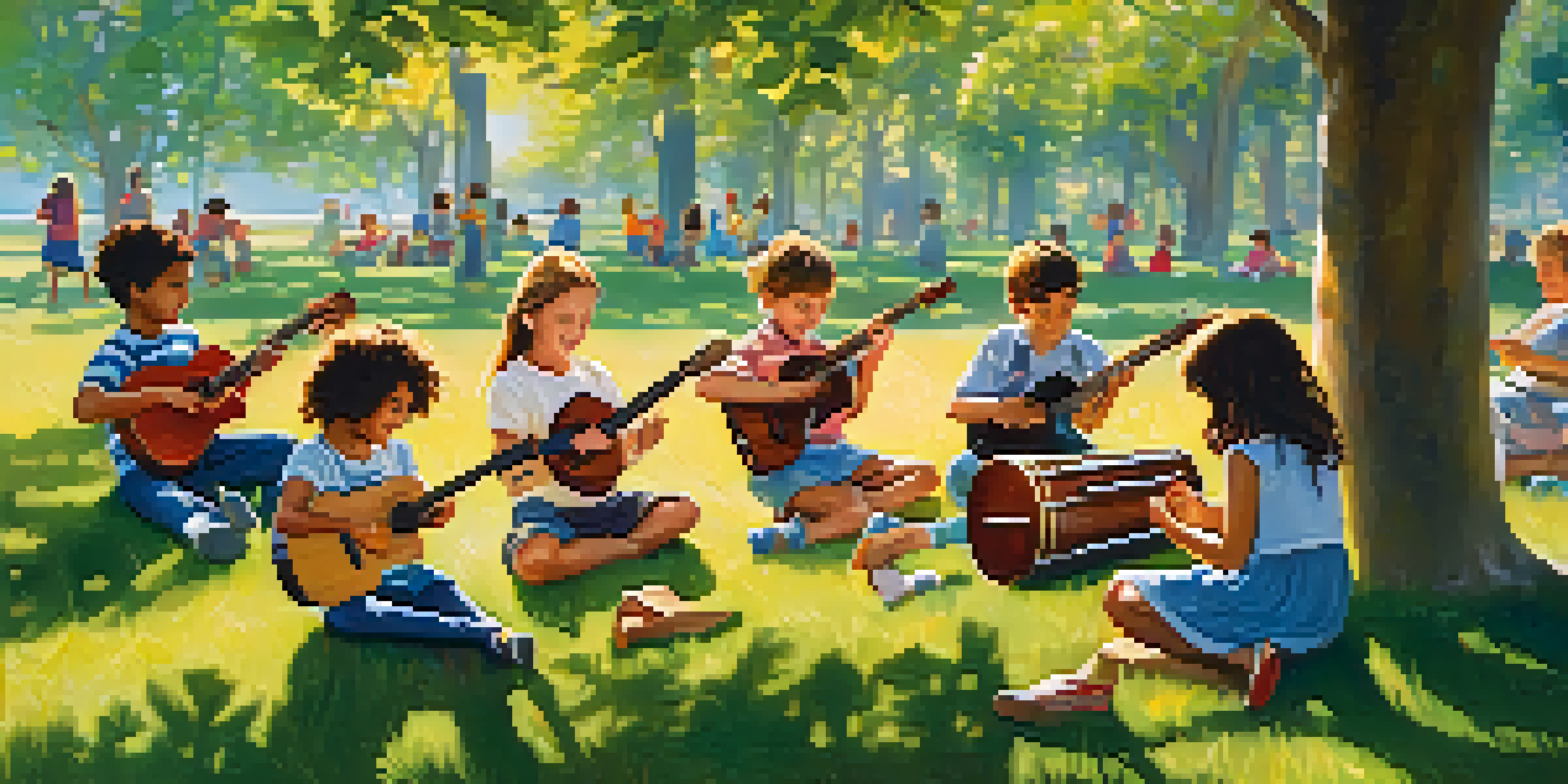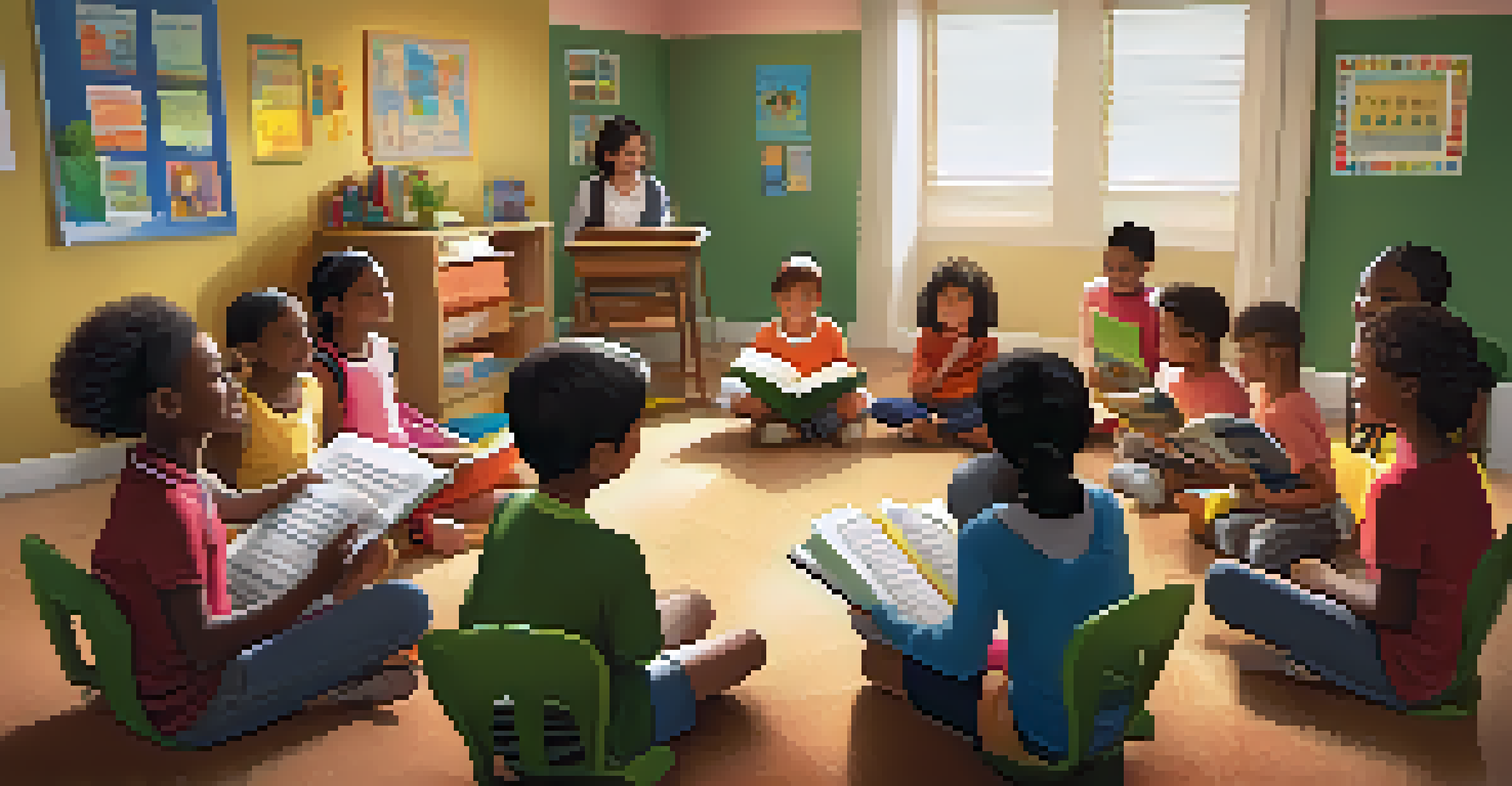The Benefits of Group Music Activities for Child Development

Enhancing Social Skills Through Music Collaboration
Group music activities foster collaboration among children, allowing them to work together towards a common goal. When kids play music as a team, they learn how to communicate effectively, share ideas, and support one another. This teamwork experience not only builds friendships but also enhances their social skills, crucial for their overall development.
Music can change the world because it can change people.
Moreover, participating in group music helps children understand the importance of empathy. They learn to listen not just to their own instruments but to their peers as well, creating a harmonious environment. This practice of paying attention to others' contributions nurtures a sense of belonging and community.
As they engage in musical activities, kids also gain confidence in expressing themselves. Whether it's singing in a choir or playing in an ensemble, children learn that their voice matters. This boosts their self-esteem and encourages them to participate more actively in other social situations.
Boosting Cognitive Skills Through Musical Learning
Engaging in group music activities stimulates various cognitive skills in children. Learning to read music, recognizing rhythms, and understanding melodies enhances their brain development. These skills translate into improved memory and focus, which are beneficial in academic settings.

Additionally, music encourages critical thinking and problem-solving abilities. When faced with challenges, like figuring out a new song or coordinating with others, children must think creatively and adapt. This kind of mental exercise is invaluable as it prepares them for complex tasks in the future.
Music Builds Social Skills in Kids
Group music activities foster collaboration, communication, and empathy among children, enhancing their social skills.
Moreover, the discipline required to practice and perform music cultivates perseverance. Children learn that mastery takes time and effort, instilling a strong work ethic. This sense of discipline can extend beyond music, positively impacting their approach to school and other activities.
Fostering Emotional Development Through Musical Expression
Group music activities provide a safe space for children to express their emotions. Whether they are feeling joy, sadness, or excitement, music allows kids to communicate these feelings in a constructive way. This form of expression can be particularly beneficial for those who may struggle with verbalizing their emotions.
The beautiful thing about learning is that no one can take it away from you.
As they share these musical experiences with peers, children build emotional connections and learn to understand each other's feelings. This not only enhances their emotional intelligence but also prepares them to navigate complex social situations in the future. By recognizing and empathizing with others’ emotions, they develop stronger relationships.
Moreover, participating in music can be a great stress reliever for children. The act of creating and performing music can help alleviate anxiety and boost mood. This emotional outlet is essential for maintaining mental health and overall well-being in a child's development.
Encouraging Physical Coordination Through Music Movement
In group music activities, children often engage in physical movement, which promotes motor skills development. Clapping, dancing, or playing instruments requires coordination and rhythm, helping kids improve their physical abilities. These actions not only enhance their gross motor skills but also fine-tune their hand-eye coordination.
Furthermore, incorporating movement into music reinforces concepts like timing and balance. As children learn to synchronize their movements with musical elements, they develop a better sense of timing. This understanding is crucial not just in music but in various physical activities and sports as well.
Music Enhances Cognitive Development
Engaging in musical learning stimulates cognitive skills such as memory, focus, and critical thinking in children.
Lastly, the energetic nature of music encourages children to be active. Movement paired with music makes physical activity enjoyable, helping to instill a lifelong appreciation for staying active. This connection between music and movement can foster healthy habits as they grow.
Instilling Cultural Awareness Through Diverse Music
Group music activities often incorporate a variety of musical styles and cultural backgrounds, exposing children to diverse traditions. This exposure cultivates cultural awareness and appreciation, allowing kids to understand and respect different perspectives. Such experiences encourage inclusivity and acceptance from an early age.
As children explore music from around the world, they also learn about the stories and emotions tied to those cultures. This connection deepens their understanding of global diversity and the role of music in human expression. Through this lens, they can see music not just as a form of entertainment, but as a universal language.
Moreover, engaging with diverse musical traditions can inspire creativity. Children may be motivated to experiment with different sounds and styles, leading to innovative musical expressions. This creative exploration can spark a lifelong passion for music and the arts.
Promoting Language Development Through Musical Rhymes
Group music activities often include singing songs and reciting rhymes, which play a significant role in language development. These activities enhance children's vocabulary and phonetic awareness, making language learning fun and engaging. The repetition found in music helps solidify language concepts in their minds.
Additionally, learning lyrics and melodies challenges children to remember and articulate words accurately. This boosts their verbal skills and confidence in speaking. As they sing together, they also practice pronunciation and enunciation, which are essential components of effective communication.
Music Supports Emotional Growth
Participating in group music provides a safe outlet for emotional expression, helping kids build emotional intelligence and resilience.
Moreover, music can introduce children to storytelling elements, enriching their understanding of narrative structures. By engaging with songs that tell stories, kids learn to follow plots and identify characters. This narrative comprehension is crucial for their overall language skills and literacy development.
Building Resilience and Team Spirit Through Music Challenges
Participating in group music activities often involves facing challenges, whether it's learning a new piece or performing in front of an audience. These experiences teach children resilience as they learn to overcome obstacles and handle mistakes. Embracing failure as part of the learning process is a valuable life lesson.
Moreover, the shared experience of working through challenges fosters a strong sense of team spirit. Children learn to celebrate each other's successes and support one another during difficulties, building camaraderie. This teamwork is a foundational aspect of their development, helping them understand the value of collaboration.

Finally, the sense of accomplishment after completing a musical project can greatly enhance children's self-confidence. They learn that hard work and dedication pay off, instilling a sense of pride in their efforts. This confidence can translate into other areas of their lives, encouraging them to tackle challenges head-on.